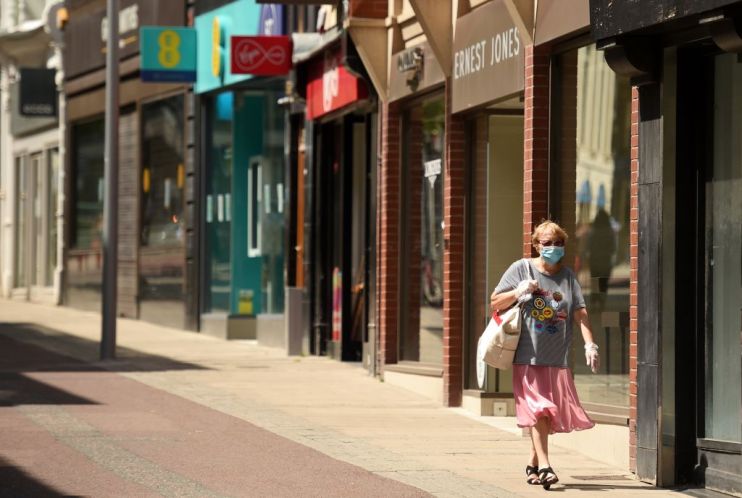Has the dream of a ‘V-shaped’ economic recovery died?

Much has been made of whether or not the UK is going to see a ‘V-shaped’ economic recovery from coronavirus. That is, a sharp fall in output followed by an almost equally quick rebound.
Those hoping for such a sharp bounce-back appeared to have been dealt a harsh blow today when official figures showed the economy grew by just 1.8 per cent in May. It was far below the 5.5 per cent analysts had predicted after April’s enormous 20.3 per cent drop in GDP.
The V-shaped recovery thesis was then whacked again by the UK budget watchdog. The Office for Budget Responsibility (OBR)’s new “central scenario” sees GDP falling 12.4 per cent this year and only growing 8.7 per cent in 2021.
The OBR’s report was noticeably more pessimistic than the “reference scenario” it produced in April. That foresaw a relatively sharp rebound with little economic scarring.
Today’s data has reignited the debate about a V-shaped recovery. Many analysts have called it into question. But others said it is simply too early to say, given that most of the coronavirus lockdown was eased in June and July.
“Hopes of a V-shaped recovery are fading fast,” said Tom Stevenson, an investment director at Fidelity International.
“I suspect we’re looking at something resembling far more of a ‘W’ – a series of improvements and relapses, before a proper recovery takes hold.”
Services sector growth far from V-shaped
Thomas Pugh, UK economist at consultancy Capital Economics, said: “The 1.8 per cent month-on-month rise in GDP in May is a disappointing first step on the road to recovery.”
He said it “suggests that hopes of a rapid rebound from the lockdown are wide of the mark”.
The UK’s huge services sector expanded by just 0.9 per cent in May after shrinking 18.9 per cent in April, the ONS said. It was much slower than the roughly five per cent expansion analysts had predicted.
The UK’s restrictions on much services activity remained in place throughout the whole of May, however.
Pugh said: “Of course, June will almost certainly be better. The opening of many non-essential shops in the middle of the month and pubs and restaurants for takeaway should ensure that services activity jumped.”
Nonetheless, analysts thought May’s weak GDP reading was a bad sign for the pace of the UK’s economic recovery.
Brexit also weighing on UK economy
Charles Hepworth, investment director at Gam Investments, said: “There are just too many negatives weighing on the UK economy.”
He flagged the end of the Brexit transition period that has in effect kept the UK inside the EU. “Hard Brexit concerns with no workable trade deal will likely continue to build over the summer months,” he said.
Not all commentators were so downbeat, however. Andrew Goodwin, chief UK economist at Oxford Economics, said: “We were a little surprised by how weak the May data was.”
Yet he said: “We are still optimistic that June and July will see strong month-on-month rises in GDP.” He said this would reflect “the much more significant relaxation of lockdown restrictions in those two months”.
“A reasonably strong rebound is the most likely scenario, but the risks are heavily skewed to the downside.”
Chancellor bets the house on economic recovery
Chancellor Rishi Sunak has pumped unprecedented amounts of stimulus into the UK economy.
Last week, he unveiled a job retention bonus that will pay firms to take back furloughed workers. He also revealed plans to get young people working again.
The OBR today said the UK budget deficit is set to surge to a peacetime record of around £370bn this year. The deficit is the gap between the government’s income and its spending.
Suren Thiru, head economist at the British Chambers of Commerce, said: “More significant fiscal stimulus is likely to be needed.”
Kemar Whyte, senior economist at the National Institute of Economic and Social Research, said he is particularly worried about the unwinding of support programmes like the job retention scheme.
“We are doubtful about a V-shaped recovery,” he added.
“The measures unveiled by the chancellor at the summer statement are a poorly timed change of tack,” he said. Whyte said they “could trigger a sharp rise in unemployment, and possibly lead to permanent long-term damage to the economy”.